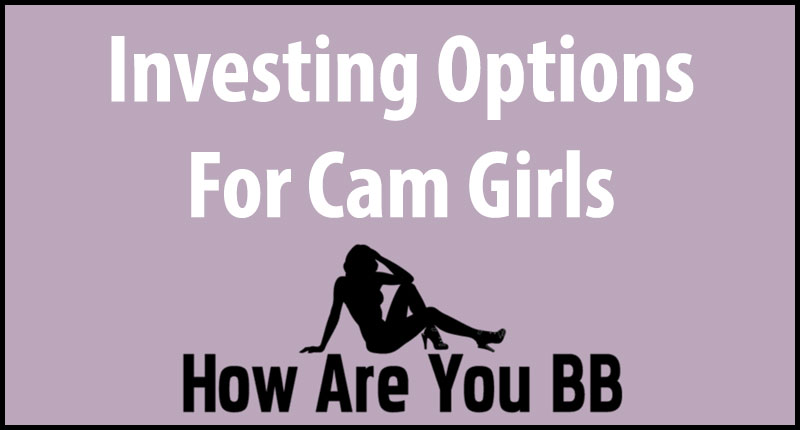As a cam girl, you need to know a few very important things. One of those things is that managing your money can help you make more of it. Smart investing can change the trajectory of your life – for real! So, please don’t skip this article. I wanted to revisit this to share some updated information with you on investing in general and making your cam earnings last. Please keep reading and ask if you have questions. I’ve covered lots of money related posts here too (both on saving and earning). You’ll find what you need to here.

Investing Your Webcam Money
I’ll kick things off by sharing the first rule of investing: you’re never too young to invest. Investing can seem awfully intimidating with all that financial jargon but once you break it down it’s pretty simple to understand.
Most cam girls invest to make a little money on the side, or bulk up their savings for retirement, or to beat inflation. Now, I’m not talking about making spur of the moment investments on Robinhood via $GME. I’m talking about smart investing.
If you’re already setting aside money in a savings account you’re ahead of the game, but unfortunately, that money is just sitting there earning less than 1% when it could be making you more money.
Retirement
The first thing you should look into is investing your retirement savings. This is more than just naming your saving account “retirement funds.”
You need to put your money into a retirement fund like a 401(k) or an IRA. There are three main types of IRAs: Traditional, Roth, and Rollover. Each has its own advantage.

Traditional IRA
In a traditional IRA you make contributions to your account with money you might be able to deduct on your tax return. Potentially your earnings can grow tax-deferred until you withdraw them for retirement.
A lot of retirees find themselves in a lower tax bracket than they were while they were working so the tax-deferral means your money might be taxed at a lower rate.
Roth IRA
With a Roth IRA you make contributions with money you’ve already paid taxes on. If you meet certain conditions (your bank will be able to go into detail about the conditions you need to meet) you could have tax-free withdrawals in retirement.
Rollover IRA
Finally a Rollover IRA is a Traditional IRA intended for money that has rolled over from a retirement plan. This means you would take money from an employer-sponsored plan such as a 401(k) or a 403(b) and move it into an IRA.
So why would you need an IRA? For starters your savings have the potential to grow or compound faster than they would in a taxable account.
Even if you have a 401(k) from an employer you will still need up to 85% of your pre-retirement income in retirement and that 401(k) may not cut it.
An IRA will help you supplement your current savings, take advantage of tax-deferred or tax-free growth, and help you gain access to a wider range of investment choices.
Do Your Research
If you use your IRA to dabble in investments that are out of the mainstream (meaning you go off the beaten path from the typical offerings of banks and mutual funds) you’re going to want to do some serious research beforehand.
For example, some people buy coins with their IRA. Lots of people buy gold and silver coins because they’ve been measurements of value for thousands of years.
Gold, Silver & Coins
Coins tend to be stable when stock markets crash or inflation soars but that’s not to say the price of gold and silver doesn’t fluctuate, because they do. A lot of mainstream IRA custodians such as banks and mutual funds don’t offer coins as an IRA option.
IRS regulations require storage be overseen by a custodian but custodians don’t have to offer this service. The same holds true for precious metal bullions like gold or silver bars.
IRAs allow for metals such as gold, silver, palladium, and platinum to be purchased with an IRA but many financial advisors say it doesn’t perform over time and probably isn’t worth the hassle of getting it appraised and valued every year.

Newbie…Please Stick To Funds
If you’re a first time investor your safest bet is to invest in mutual funds. Professional investors collect groups of securities and you can invest in these funds without picking every individual stock or bond yourself. This lets you diversify your portfolio without worrying about which stock to pick.
Many Baskets
Which leads us to the most important rule of investing: diversifying. You never want to put all your eggs in one basket.
That’s the quickest way to lead to financial disaster. Always diversify your investments because you never know what stocks will fall and what stocks will rise.
Avoid “Hot” Stocks
Try not to jump on the stock of the moment, otherwise known as hot stocks. There’s always a stock that’s generating buzz but it’s better to research the company that’s being buzzed about than to jump on the stock of the moment and buy a ton of it.
If you do play the stock game don’t let the morning news dictate whether you should buy or sell. Active investing (buying and selling stocks strategically and frequently) doesn’t work for most people and it’s not always a sound investment.
Check Your Emotions At The Door
Don’t get wrapped up in a stock for sentimental purposes. If a stock performed well in its past performances but the security is falling, you have to be willing to let go.
Securities are only as a good as how they’re currently performing, so be prepared to let go of a stock that may have been good for awhile but has turned bad.
It’s also bad to get caught up in checking the stock ticker all day as markets and stocks go up and down every day. And never invest money you need fast access to. Experts suggest you should never invest money you’ll need within five years because if the market goes down you won’t recoup those costs.
Conclusion: Get Help, But Do Something…
Securities, IRAs, and investing can be overwhelming and risky so it’s always best to consult a professional. There are tons of great resources out there that will help you invest your money wisely.
If you want to learn more about investing contact a financial planner or a wealth adviser or even an automated online investing platform. Feel free to reach out to me for more information if you need to know more. Important Note: I’m happy to share personal experiences, but non of it should be misconstrued as financial advice.
